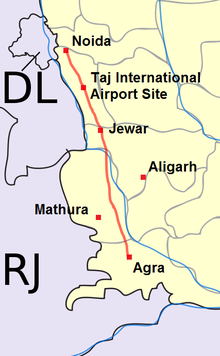|
Yamuna Expressway
Yamuna Expressway is a 6-lane wide (expandable to 8) and 165.5 km (102.8 mi) long access-controlled expressway in the Indian state of Uttar Pradesh. It is presently India's sixth longest expressway and connects Greater Noida with Agra. It was built to de-congest the older Delhi–Agra national highway (NH-2) or Mathura Road. The expressway saw an investment ₹12,839 crore (US$1.5 billion) and was inaugurated on 9 August 2012 by then Chief Minister of UP Akhilesh Yadav.[1][2] A total of 13 service roads of about 168 km were built for local commuters to access the expressway.[3][unreliable source?] Yamuna Expressway is connected with Eastern Peripheral Expressway via an interchange which is built at Jaganpur Afzalpur village near Noida International University in Gautam Buddh Nagar district.[4] HistoryAfter years of delays, construction was completed in May 2012,[5] and the Yamuna Expressway was formally inaugurated on 9 August 2012[1] about two years behind its original target completion date.[6] Landing of Fighter jetsIn a first for military aviation in India, the Indian Air Force on 21 May 2015 successfully landed a French Dassault Mirage 2000 on the Yamuna Expressway near Raya village, Mathura. The mock drill was a practice run to evaluate the utility of using highways for emergency landings by military aircraft.[7] CharacteristicsThe Yamuna Expressway has SOS booths along the route besides a toll-free helpline. CCTV cameras are installed every 5 km (3.1 mi) along the expressway. There are mobile radars to monitor compliance with minimum and maximum speed limits; and one highway patrol every 25 km (16 mi). The Expressway is expected to be used by over 100,000 vehicles every day, and reduce travel times between Greater Noida and Agra from four hours to one hour 40 minutes.[8] There is a patrol station at Tappal, the halfway point on the expressway. Tappal 60 km (37 mi) from Noida Sec. 37 i.e. botanical garden.[9] Metro Rail connectivityMetro rail service from Pari Chowk to Yamuna Expressway Sector 18 and 20 will be added in the future, according to officials. Development  The Expressway was developed by Yamuna Expressway Industrial Development Authority (YEIDA) in 3 phases and the contract was awarded to Jaypee Infratech Limited:
Speed Limit The speed limit on the expressway is 100 km/h (62 mph) for vehicles. The right most lane on the expressway is reserved for overtaking only.[10] Heavy vehicles are limited to a maximum speed of 60 kilometers per hour.[11] Upcoming Residential Project Yamuna Expressway has become most preferred for Builders and developers. Many reputed builders are bringing residential projects at Yamuna Expressway. To inject new life into the real estate market, Yamuna Expressway Industrial Development Authority has come up with lucrative affordable housing projects.[12] Under the new subvention scheme YEIDA has launched 200 small ticket size apartments and 80 large size residential flats. Agra–Lucknow connectivity A 302 km (188 mi) Agra–Lucknow Expressway Project is completed with estimated budget of ₹ 15,000 crore extends YEA to Lucknow enabling fast transit. Agra–Lucknow Expressway will extend to the proposed Sanjay Khan project of a theme park of seven cities. Yamuna Expressway linked to Agra-Lucknow Expressway through Agra Inner Ring Road Expressway 11.9 km (7.39 mi) which also shortens the distance and avoid the heavy traffic of Agra, tourists can directly reach Taj Mahal. GoalsThe goals of the expressway are as follows:
FeaturesThe Yamuna Expressway is India's lengthiest access-controlled concrete expressway. Medical amenities such as vans, stretchers, and beds are available on request, and partnerships with two hospitals provide access to air ambulance for urgent situations. The expressway is equipped with closed-circuit television surveillance, which is used to monitor vehicle's speeds. Authorities plan to install fuelling stations, food courts, ATMs, and public restrooms along the expressway.[11] Toll ratesToll are charged at three points along the expressway. Cars are charged ₹2.65 /km (1.65 /mi) and mini-buses ₹3.85 /km (2.39 /mi). Buses and Trucks are charged ₹7.85 /km (4.88 /mi). Heavy vehicles are charged ₹11.94 /km (7.419 /mi).[14] There are 16 toll plazas on each side of the expressway.[11] Status updates
See also
References
KML is from Wikidata
|
||||||||||||||||||||||||||||||||




